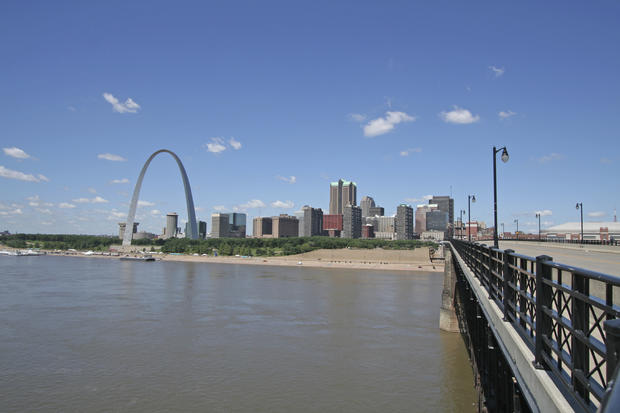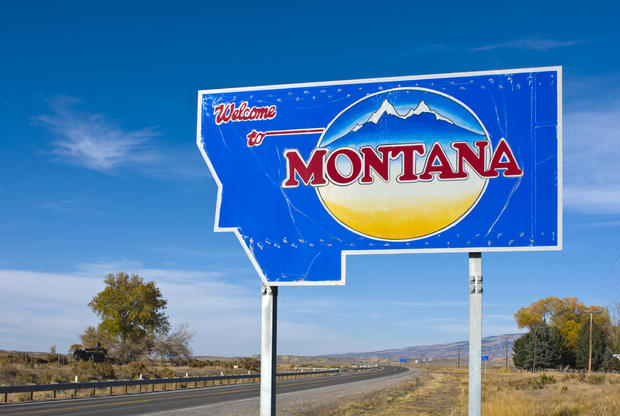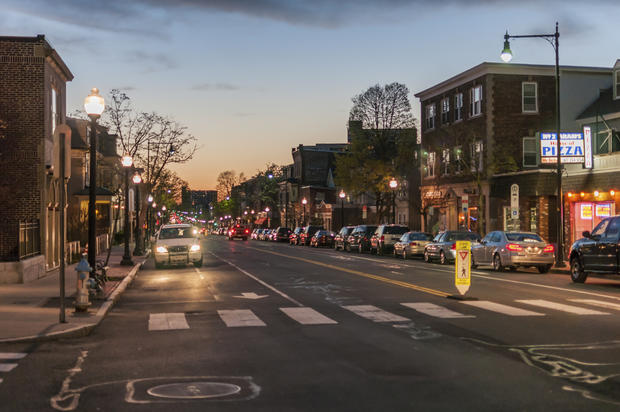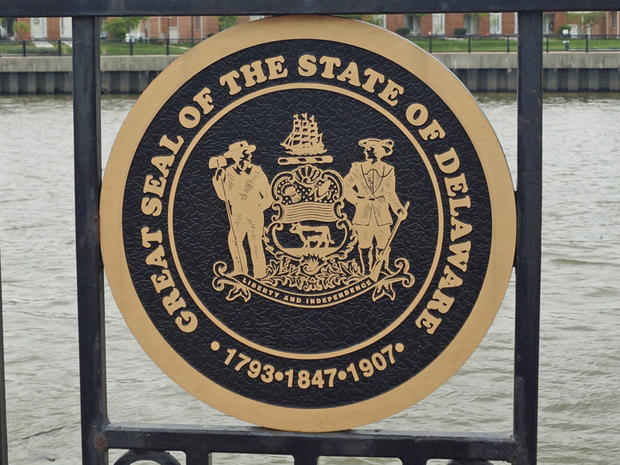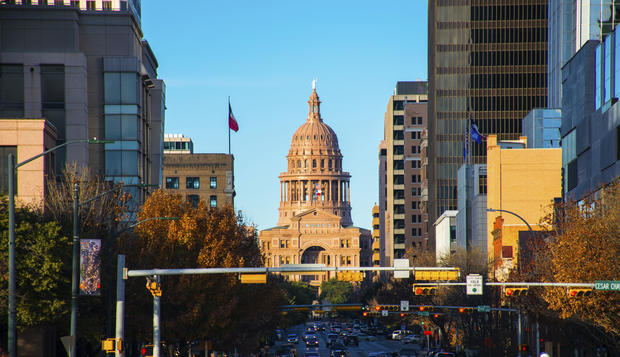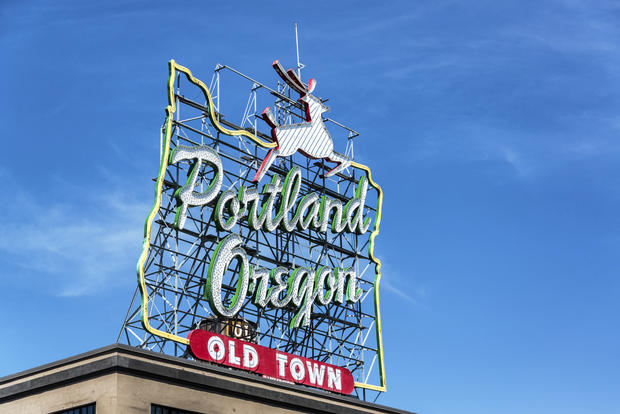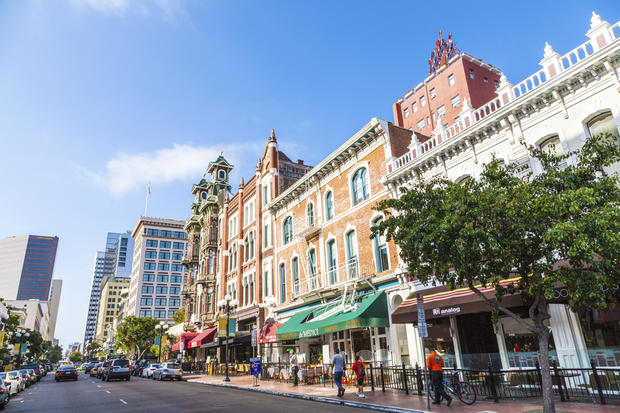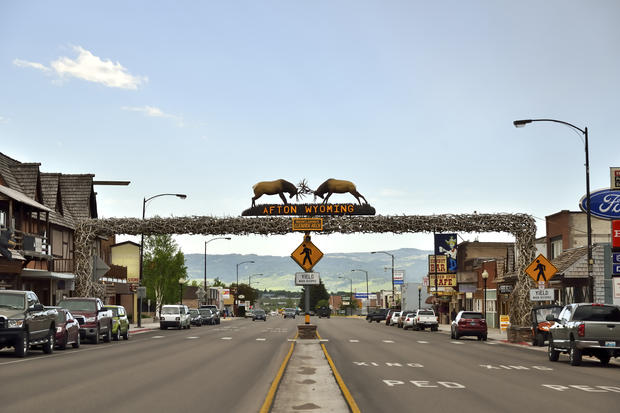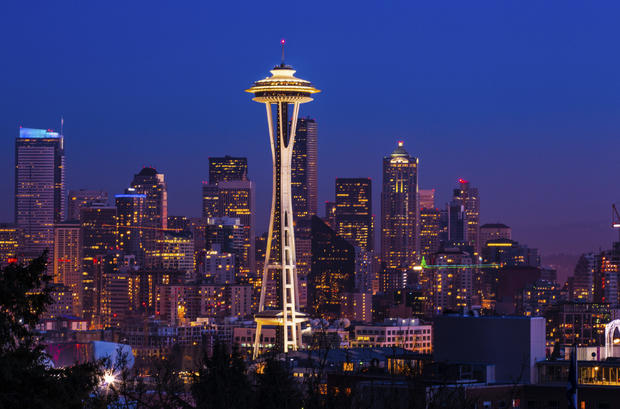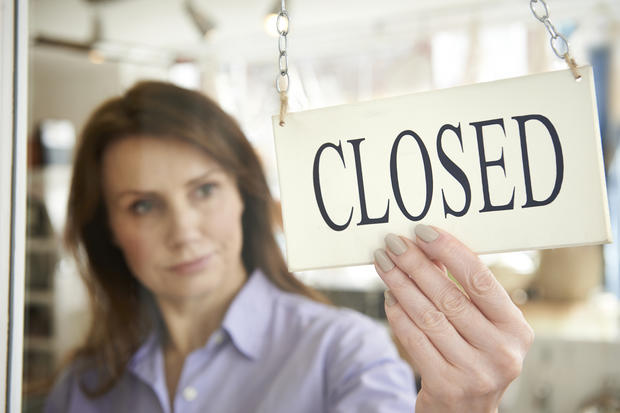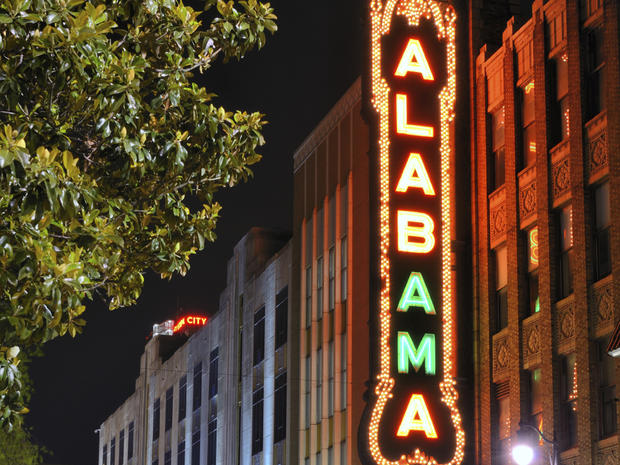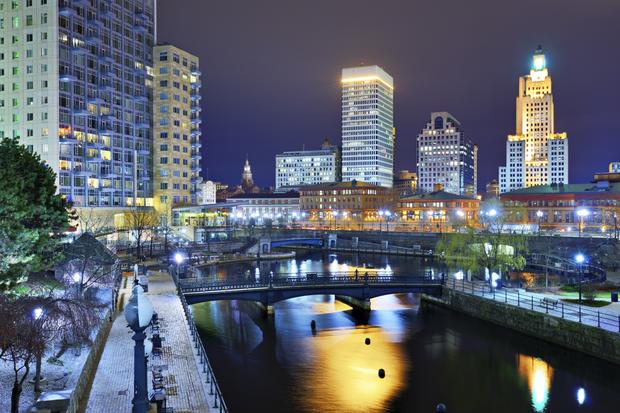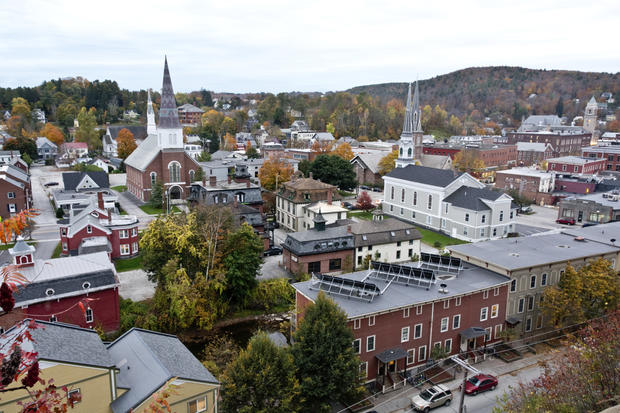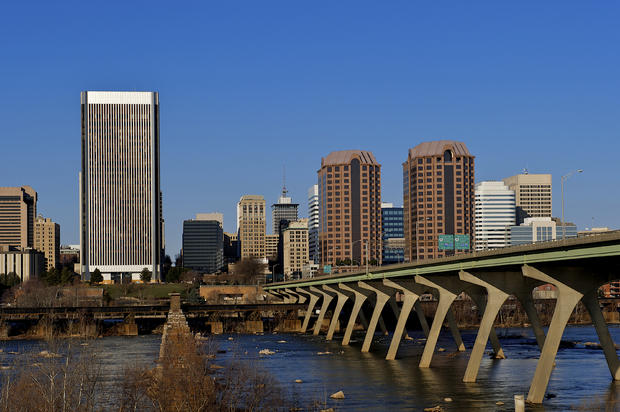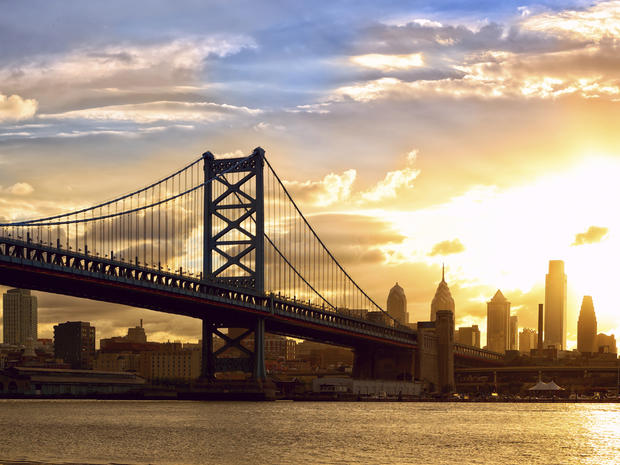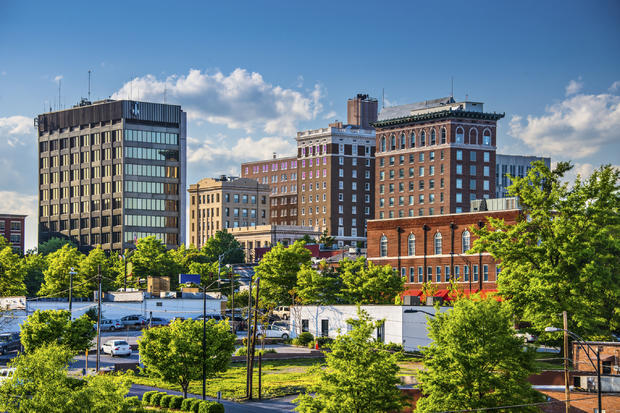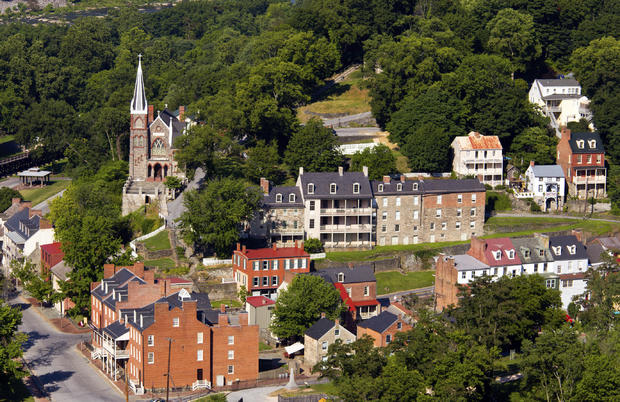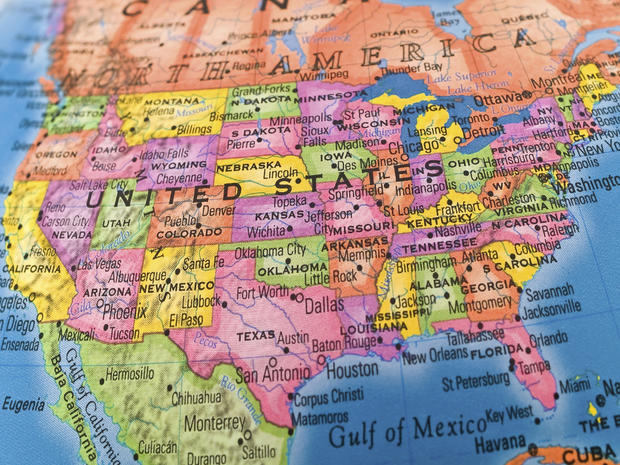Where to start a new business? The 10 best and worst states for entrepreneurs
By Elyssa Kirkham/GOBankingRates
Entrepreneurship is a cornerstone of the American economy, and it has reached record heights in recent years. Becoming an entrepreneur is a dream for many Americans; two in five employees hope to someday strike out on their own, according to a survey from the University of Phoenix Business School.
But starting a business is a serious undertaking, and part of launching a company means getting an idea of how well your state fosters new businesses and startups. To find out which states are the best or worst for entrepreneurs, GOBankingRates conducted a study that looked at the startup opportunities, existing small businesses, business tax climate and other factors in each state.
Based on the study's findings, GOBankingRates generated this ranking of the best and worst states for entrepreneurs.
Location is a major factor of success when starting a new business. The 10 best states for business owners have a strong culture of entrepreneurship and high numbers of existing small businesses, as well as a high rate of survival for these companies. They also help new businesses keep up with operating expenses thanks to lower costs of living, fewer taxes and accessible small business lending.
Click through to see how smart it would be to start a business in your state.
This article, The 10 best and worst states for entrepreneurs, was originally published on GOBankingRates.com.
More from GOBankingRates:
- 13 million-dollar businesses that turned down Shark Tank deals
- 30 Walmart ripoffs you should avoid
- Warren Buffett's 6 best finance tips for 2015
Editor's note: The methodology is explained on the last page.
Best: Missouri (10)
Missouri has the fourth-highest business survival rate in the nation, with twice as many small businesses founded in 2013 as failed that same year. For entrepreneurs in Missouri, this is a positive sign that the odds of success are in their favor. Missouri also offers small businesses a low cost of living and business-friendly taxes.
The state has a lower gross domestic product per capita, however, which could signal a slower local economy. Missouri also has below-average rates of small business loans, indicating that financing could be harder to come by in this state. Despite these drawbacks, Missouri entrepreneurs still have a number of factors working in their favor, including an average employee availability score, making it the No. 10 best state to start a business.
Best: Montana (9)
Montana has the highest number of startups per capita, at 195.7 per 100,000 residents. Businesses are also created at the highest rate in Montana, with 0.54 percent of residents entering entrepreneurship each month. Montana is small-business friendly with a high number of small businesses and employees of small businesses in the state, and it has a favorable business tax climate.
There are a few obstacles small businesses might have to contend with in Montana, like the low availability of qualified employees due to a low college graduation rate. The state's below-average GDP also indicates a slow-growing economy, but Montana has a solid base of existing small businesses and conditions that could pave the way for more in the near future.
Best: Massachusetts (8)
Businesses in Massachusetts are some of the least likely to fail, indicated by the state having the third-highest business survival rate in the nation. Entrepreneurs founded new businesses at 2.45 times the rate they failed in 2013. Massachusetts' existing small businesses are already a major force in the state, employing 20.8 percent of its population, which is a larger portion than in most states.
Another sign of growing business opportunities is the state's high GDP per capita of $68,185. And as a hub of higher education in the U.S., Massachusetts schools produce well-qualified candidates for employment.
Startups could face some challenges in Massachusetts. The state has one of the lowest rates of small business lending and one of the highest costs of living. Companies that can find a way to get past these obstacles might still have a better chance at success in this state, however.
Best: Delaware (7)
Delaware's benefits and opportunities for new businesses put it in the top 10. It boasts a strong per-capita GDP, which at $67,075 is the eighth-highest in the U.S. This state also is above average in the category of startup activity.
Delaware has a high rate of graduating college students (66 percent), making it easier to fill open positions with qualified candidates. In terms of employment availability and small businesses employing people, however, its numbers are average.
In this South Atlantic state, the higher cost of living can inflate expenses for small businesses. A better-than-average score for business tax climate, however, can be a relief to some business owners.
Best: Texas (6)
Entrepreneurs in Texas can build on a strong local economy as signaled by the state's $61,136 per-capita GDP, the ninth-highest in the nation. Even with an expanding economy, however, costs in this state are low. Texas is among the 10 cheapest states to live in, which helps small businesses keep expenses low and profit margins growing.
Texas has lower business taxes and more access to small business loans than most states. These factors could explain why Texas has the eighth-highest business survival rate in the country.
Despite being one of the country's most populous states, however, Texas has a lower-than-average availability of employees and a low college graduation rate. Small businesses in Texas might face more competition to hire qualified candidates.
Best: Oregon (5)
Oregon scored well for small business lending due to its high ratio of 80.2 loans per 1,000 small business employees. This ratio indicates that entrepreneurs can gain easier access to funding in Oregon than they would in most states. Oregon small businesses also benefit from low business taxes, and a higher-than-average GDP per capita indicates a strong local economy with high productivity. These factors put Oregon at No. 5 among the best states for entrepreneurs.
Oregon fell behind in a couple of categories, including a higher cost of living that can drive up costs for businesses. The state also had a lower-than-average rate of new startups.
Best: Colorado (4)
Having the highest rate of small business loans helped land Colorado the No. 4 spot on this list, with 98.3 loans per 1,000 small business employees. Besides accessible lending, Colorado has high numbers of established small businesses and people employed by small businesses. Colorado also boasts an above-average rate of business survival and lower business taxes.
The only drawbacks for Colorado small businesses might be a competitive hiring market. The state's low unemployment rate and below-average graduation rate could make it tough for newer companies to build their teams.
Best: California (3)
California boasts the highest business survival rate of any state, with 3.5 times more businesses created than closed in 2013. This boom in new business shows the strong entrepreneurial spirit of California residents, as does its high density of startups (141 per 100,000 residents).
California has the second-largest pool of potential employees and one of the highest unemployment rates in the nation. Entrepreneurs might have an easier time of securing funds in the Golden State compared with other states, however, because the state has the fifth-highest rate of small business loans (80.6 per 1,000 small business employees).
Small businesses in California have to face some of the highest business taxes and one of the highest costs of living in the country. The state's overall attractiveness, lending opportunities, and business survival rate, however, are enough to rank California No. 3 on this list.
Best: Wyoming (2)
The main obstacle for Wyoming entrepreneurs is finding qualified candidates due to the state's low employee availability and college graduation rates. Despite this challenge, the state ranks second among the best states for entrepreneurs.
Wyoming has the best business tax climate score of any state, which means entrepreneurs in this state can potentially keep more of their earnings. The Cowboy State also boasts the second-highest GDP per capita, $75,648, which shows that this state has a strong economy with productive businesses. Wyoming also has a high portion of existing small businesses that employ 23 percent of the state's population.
Best: Washington (1)
Washington offers small businesses a high chance of survival, second only to California. In 2013, the number of businesses founded in the state was 3.5 times the number failed businesses. Washington has a high per-capita GDP of $60,476 and the sixth-lowest business tax climate score in the nation, which indicates a solid economic and business foundation for new business growth.
Other factors that help make Washington the best state for entrepreneurs is the state's large pool of available employees, equal to 5.8 percent of the state's population, and a high rate of small business lending. Even with Washington's higher-than-average cost of living, new companies can thrive in this state.
A look at the 10 worst states for entrepreneurs
While the best states help new businesses thrive, the worst states for entrepreneurs have a number of drawbacks that can make it hard for business owners to achieve success. Building a strong business in these states isn't impossible, but entrepreneurs thinking of striking out on their own should be aware of the possible obstacles a small business could face in these areas and have a plan to overcome them.
For instance, these states have high rates of failed businesses, a lack of existing small businesses and low rates of entrepreneurship. Business owners in these states have to contend with high costs, high taxes and difficulty accessing lending, as well as a smaller or less talented workforce to draw from compared with the states that are best for small businesses.
Worst: Alabama (10)
Alabama residents are less likely than people in other states to become entrepreneurs, and 31 percent of Alabamans who choose to become entrepreneurs are unemployed at the time and are driven primarily by necessity rather than opportunity. This Southern state has fewer existing small businesses and has one of the smallest small-business-employed workforces in the nation -- just 15.8 percent of the state's population.
A weak GDP per capita of $41,127 is yet another sign of Alabama's lackluster economic environment, along with a higher-than-average rate of business closures. The state's cost of living falls 7.6 percent below the national average, resulting in lower costs for businesses, but Alabama is still one of the worst states for entrepreneurs.
Worst: Rhode Island (9)
Rhode Island entrepreneurs might have some serious cash flow problems, as this state is the fifth-worst for small business lending. With a cost of living that's 25.7 percent higher than the rest of the nation's and high business taxes, Rhode Island businesses have more costs eating into their profits.
Businesses in Rhode Island could benefit from tapping the state's larger-than-average pool of available employees, which is equal to 6.6 percent of the state population. A higher graduation rate injects a group of graduates equal to 4.5 percent of the population into the workforce each year. Even with access to a wide pool of candidates, however, small businesses in Rhode Island face substantial financial obstacles, putting the state at No. 9 on this list.
Worst: Arkansas (8)
Arkansas businesses face lower costs in general because of the state's cost of living, which is 8.4 percent lower than the national average. The state also offers a large pool of available employees, equal to 6.5 percent of the state's population.
But that's where the benefits for Arkansas entrepreneurs end. The state has the fifth-lowest GDP per capita in the nation, generating just $40,924 a year per resident. Arkansas also has a below-average number of small businesses and smaller workforce employed by those companies. And with the fifth-highest rate of business closures, the number of Arkansas small businesses is shrinking. For every 100 Arkansas businesses founded in 2013, 105 businesses failed.
This lack of growth and other factors, such as higher-than-average business taxes, make Arkansas the No. 8 worst state in which to start a business.
Worst: Vermont (7)
Entrepreneurs hoping to start a business in Vermont should expect to contend with high costs. This state has the fourth-worst business tax climate score in the country (tied with Minnesota and Rhode Island), as well as a cost of living that's 20.5 percent higher than the national average. Business founders hoping to cover those costs with a loan are out of luck; Vermont has the fourth-lowest rate of small business loans in the nation, just 41.3 per 1,000 small business employees.
Vermont businesses are also held back by the state's low GDP per capita and employee availability, as well as a higher-than-average rate of business failures. Even though the state also has the highest density of small businesses and employees of small businesses, it still ranks among the worst states for entrepreneurs.
Worst: Maryland (6)
While its higher GDP per capita of $58,335 indicates a strong local economy, Maryland's poor business climate lands it among the 10 worst states for entrepreneurs. Small businesses in Maryland face high business costs due to the state's higher-than-average business taxes and a cost of living that's 19.9 percent higher than the national average.
Maryland businesses in need of startup capital are out of luck as well because the state has the sixth-lowest rate of small business loans in the nation (42.9 per 1,000 small business employees). Maryland businesses also fail at a higher rate than those in other states, with 2013 business creations surpassing business closures by just 2 percent.
Worst: Virginia (5)
Bad news for Virginia entrepreneurs: The state has the second-highest rate of business failures in the nation. For every 100 new businesses founded in 2013, 114 businesses failed. In addition to few startups, Virginia has fewer small businesses per capita, and small businesses employ a smaller portion of the state's residents (17.5 percent).
Virginia's small businesses also tend to have less access to financing, with just 43.7 loans per 1,000 small business employees. The state also charges higher-than-average business taxes and has a higher cost of living, which means businesses in this state face higher costs in general. Even with a higher-than-average GDP per capita and rate of college graduates in the state, Virginia's poor climate for small businesses makes it the fifth-worst state for entrepreneurs.
Worst: Pennsylvania (4)
Pennsylvania has a higher rate of college graduates entering the workforce than most states and a GDP per capita on par with the national average. But in all other areas, Pennsylvania has little to offer entrepreneurs.
The biggest factors that pushed Pennsylvania down in this ranking are its low business survival rate and lack of startup activity. Pennsylvania has the third-highest rate of business failures in the U.S. Residents of the state become entrepreneurs at a rate that is about 30 percent lower than the national average, and Pennsylvania also has one of the lowest startup densities of any state.
Pennsylvania also scores low in several other measures of this study, with a higher cost of living and lower rates of small business lending and employee availability.
Worst: South Carolina (3)
South Carolina has a low number of existing small businesses as well as a smaller portion of its population employed by small businesses -- just 15.1 percent, the fifth-lowest in the U.S. The state also has the third-lowest GDP per capita at $39,380, which contributes to the state's poor business conditions for small businesses. South Carolina businesses could also have difficulty getting loans, as indicated by the state's low rate of small business lending (46.3 per 1,000 small business employees).
South Carolina still offers some low costs, such as average business tax and cost-of-living rates, but these factors won't mean much to South Carolina entrepreneurs already fighting slow business growth in the area.
Worst: Hawaii (2)
The top challenge that entrepreneurs face in Hawaii is high costs, as this state has the highest cost of living in the nation. And many new businesses will have to figure out how to cover these costs with less financing because Hawaii's rate of small business lending is in the bottom 12 of all states. These high costs put Hawaii at No. 2 among the worst states for entrepreneurs.
These factors could help explain why Hawaii has a lower business survival rate, with only slightly more businesses created in 2013 than failed that year (102 to 100, respectively). Businesses in Hawaii might also have more competition for qualified candidates because of the state's smaller pool of available employees and low number of new college graduates.
Worst: West Virginia (1)
West Virginia is the worst state for entrepreneurs, and that's reflected in its high rate of failed businesses and low number of existing small businesses. For every 100 new businesses created in West Virginia in 2013, 117 businesses failed, the highest rate of business deaths in the nation. Not that West Virginia had many small businesses to begin with -- just 63 per 1,000 residents, the lowest of any state.
West Virginia's startup density is just 81.4 per 100,000 residents, the lowest in the nation. That number isn't likely to change much in the near future if the state maintains its current rate of small business lending, which is the second-worst rate in the nation.
West Virginia does have a couple of favorable factors, such as its available workforce and higher percentage of college graduates, which are slightly better than average. Even with these positives, however, West Virginian entrepreneurs have far greater obstacles to overcome in order to achieve success than business owners in any other state.
Methodology
GOBankingRates considered nine factors to rank all 50 states on the strength of existing small businesses and startups, as well as how favorable the state's business climate is to entrepreneurs. All data was sourced on Oct. 15, 2015.
To measure existing businesses and startups, GOBankingRates looked at three factors: (1) the startup opportunity of the state, (2) the number of existing small businesses per capita, (3) and the survival rate of small businesses. Startup opportunity data (1) was sourced from The 2015 Kauffman Index: Startup Activity Report on State Trends and measured the rate of new entrepreneurs in the state, the portion of new entrepreneurs who were employed before starting a business, and the density of startups in the state. Data on existing small businesses (2) was sourced from the 2015 Small Business Profiles for the States and Territories from the U.S. Small Business Administration and ranked states based on the number of small businesses and small business employees in the state per capita. Lastly, the survival rate of small businesses (3) for each state sourced data from the Bureau of Labor Statistics' Business Employment Dynamics by State reports and was calculated by measuring the ratio of business creations to business deaths in 2013, the most recent year for which there is complete data.
GOBankingRates also measured how favorable a state's business climate is to new entrepreneurs by measuring (4) productivity in the state, (5) availability of employees, (6) education level of potential employees, (7) taxes on businesses, (8) lending to small businesses, and (9) costs in the state. Productivity (4) was measured by the state's per capita GDP in 2014, sourced from the U.S. Bureau of Economic Analysis. Employee availability (5) was calculated using data from DirectEmployers on State-by-State Job Openings and represents the portion of the population that is unemployed less the number of available jobs. Level of education (6) was calculated based on 2015 college graduation rates from the U.S. Department of Education and 2014 enrollment rates in each state sourced from the National Student Clearinghouse Research Center. This score was given half the weight of all other scores. GOBankingRates used the U.S. Chamber of Commerce's States Innovate study to source state data on business taxes (7), small business lending (8) and cost of living (9).
Several of these factors were normalized for the population of each state using the most recent population estimates from the Census Bureau.
Did your state not make the 10 ten best and worst list? Check out GOBankingRates' 50 state list below:
1
Washington
18
Idaho
35
Mississippi
2
Wyoming
19
Illinois
36
Kentucky
3
California
20
North Dakota
37
Kansas
4
Colorado
21
Michigan
38
Wisconsin
5
Oregon
22
Maine
39
Ohio
6
Texas
23
Georgia
40
Minnesota
7
Delaware
24
Iowa
41
Alabama
8
Massachusetts
25
Connecticut
42
Rhode Island
9
Montana
26
New York
43
Arkansas
10
Missouri
27
New Hampshire
44
Vermont
11
Utah
28
Arizona
45
Maryland
12
Nevada
29
North Carolina
46
Virginia
13
Florida
30
Indiana
47
Pennsylvania
14
Nebraska
31
New Jersey
48
South Carolina
15
Alaska
32
Oklahoma
49
Hawaii
16
South Dakota
33
Tennessee
50
West Virginia
17
Louisiana
34
New Mexico

